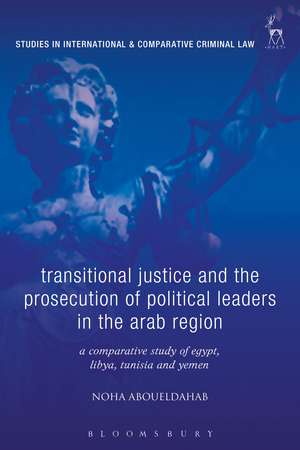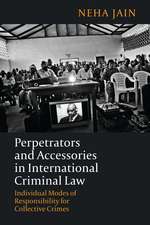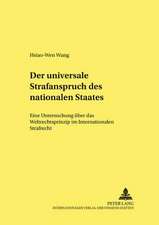Transitional Justice and the Prosecution of Political Leaders in the Arab Region: A Comparative Study of Egypt, Libya, Tunisia and Yemen: Studies in International and Comparative Criminal Law
Autor Dr Noha Aboueldahaben Limba Engleză Paperback – 19 feb 2020
| Toate formatele și edițiile | Preț | Express |
|---|---|---|
| Paperback (1) | 190.33 lei 43-57 zile | |
| Bloomsbury Publishing – 19 feb 2020 | 190.33 lei 43-57 zile | |
| Hardback (1) | 498.33 lei 43-57 zile | |
| Bloomsbury Publishing – 4 oct 2017 | 498.33 lei 43-57 zile |
Din seria Studies in International and Comparative Criminal Law
- 30%
 Preț: 897.55 lei
Preț: 897.55 lei - 21%
 Preț: 275.26 lei
Preț: 275.26 lei - 18%
 Preț: 358.30 lei
Preț: 358.30 lei - 30%
 Preț: 540.65 lei
Preț: 540.65 lei - 27%
 Preț: 345.42 lei
Preț: 345.42 lei - 28%
 Preț: 465.96 lei
Preț: 465.96 lei - 27%
 Preț: 442.83 lei
Preț: 442.83 lei - 27%
 Preț: 501.70 lei
Preț: 501.70 lei - 14%
 Preț: 603.73 lei
Preț: 603.73 lei - 14%
 Preț: 509.52 lei
Preț: 509.52 lei - 24%
 Preț: 374.34 lei
Preț: 374.34 lei - 11%
 Preț: 374.34 lei
Preț: 374.34 lei - 30%
 Preț: 779.33 lei
Preț: 779.33 lei - 30%
 Preț: 774.62 lei
Preț: 774.62 lei - 30%
 Preț: 893.89 lei
Preț: 893.89 lei - 30%
 Preț: 570.02 lei
Preț: 570.02 lei - 18%
 Preț: 302.99 lei
Preț: 302.99 lei - 18%
 Preț: 297.86 lei
Preț: 297.86 lei - 18%
 Preț: 319.86 lei
Preț: 319.86 lei - 30%
 Preț: 603.81 lei
Preț: 603.81 lei - 30%
 Preț: 718.27 lei
Preț: 718.27 lei
Preț: 190.33 lei
Preț vechi: 248.82 lei
-24% Nou
Puncte Express: 285
Preț estimativ în valută:
36.42€ • 38.13$ • 30.13£
36.42€ • 38.13$ • 30.13£
Carte tipărită la comandă
Livrare economică 07-21 aprilie
Preluare comenzi: 021 569.72.76
Specificații
ISBN-13: 9781509936403
ISBN-10: 1509936408
Pagini: 200
Dimensiuni: 156 x 234 x 15 mm
Greutate: 0.29 kg
Editura: Bloomsbury Publishing
Colecția Hart Publishing
Seria Studies in International and Comparative Criminal Law
Locul publicării:London, United Kingdom
ISBN-10: 1509936408
Pagini: 200
Dimensiuni: 156 x 234 x 15 mm
Greutate: 0.29 kg
Editura: Bloomsbury Publishing
Colecția Hart Publishing
Seria Studies in International and Comparative Criminal Law
Locul publicării:London, United Kingdom
Caracteristici
Of interest to a broad market including international and comparative criminal lawyers, transitional justice scholars, Arab scholars and political scientists with an interest in Arab political leaders, NGOs, government policy advisers, and international relations experts.
Notă biografică
Noha Aboueldahab is Visiting Fellow at the Brookings Doha Center.
Cuprins
1. Introduction Significance of the Arab Regio4Significance of Pre-transition Decisions Regarding Prosecution The Arab Region: Rethinking Transitional Justice Scholarship The Absence of a 'Return to a Liberal State' The Necessity of Pre-existing Democratic Institutions Critical Transitional Justice Literature Socio-economic Accountability and Transitional Justice Transitional Justice and the Arab Spring: Emerging Scholarship Methodology Challenges An Expanded Definition of 'Political Leaders' Case Selection Structure of the Book Conclusion 2. Egypt Summary of Post-2011 Prosecutions The Prosecution of Political Leaders in Pre-transition Egypt Content and Extent of Prosecutions in Post-transition Egypt A Military-Controlled Transition Egypt's Judicial Struggle for Independence Other Legal Challenges to Prosecutions of Political Leaders Popular Demands for Accountability Prosecutions: A Scapegoating Strategy The Socio-economic Roots of the TransitionThe Role of Workers' Movements and Labour Unions The Role of International Actors The Role of Domestic Human Rights Civil Society Organisations Conclusion Triggers Drivers Shapers 3. Tunisia The Prosecution of Political Leaders in Pre-transition Tunisia The Baraket Essahel Case: The Prosecution of Abdallah Qallel The Case of General Habib Ammar The Khaled Ben Saïd Case Content and Extent of Prosecutions in Post-transition Tunisia A Transition Muddled by the Anciens Nouveaux Workers' Movements and Labour Unions: The Leading Role of the UGTT Legal Challenges The Role of International Actors The Role of Domestic Civil Society Conclusion Triggers Drivers Shapers 4. Libya Case 630/2012-The Trial of 37 Former Members of the Gaddafi Regime The Prosecution of Political Leaders in Pre-transition Libya The Search for Accountability for Abu Salim Politicised Courts and the Prioritisation of 'Security' Content and Extent of Prosecutions in Post-transition Libya A Weak Judiciary Under Threat The Role of International Actors The Role of Domestic Civil Society Conclusion Triggers Drivers Shapers 5. Yemen The Prosecution of Political Leaders in Pre-transition Yemen The Decision Not to Prosecute in Yemen An Ambiguous Transition, Civil Society and Navigating the GCC Initiative 'A Different Kind of International Intervention': Geopolitics and the Role of International Actors Legal Challenges and a Weak Judiciary Content and Extent of Decisions Regarding Prosecution Conclusion Triggers Drivers Shapers 6. Reckoning with Transitional Justice Egypt Tunisia Libya Yemen Non-paradigmatic Transitions Whose Transitional Justice? Domestic and International Advocates of Competing Visions of Transitional Justice Limited Accountability and Foregrounding Social Justice The Content and Extent of Decisions Regarding Prosecution: A Recap Rethinking Transitional Justice Theory and Practice The Legacy of Deep State Institutions Morocco: Transitional Justice for a Quasi-transition? Conclusion 7. Conclusion
Recenzii
Beginning with the striking image of former Egyptian President Hosni Mubarak in the docks in 2011, Aboueldahab analyzes the role of transitional justice processes in relation to the political developments of the Arab Spring. She makes a compelling case for a fundamental rethinking of those approaches to fighting impunity that have become mainstreamed in the international human rights community; this book also challenges assumptions and theories regarding the notion of 'liberalizing' political transitions. Drawing from four country contexts (Egypt, Tunisia, Libya and Yemen) this book demonstrates that human rights goals were undermined because the international community and key national actors ignored the socio-legal histories that shaped the paths and horizons of political change. This book is an important contribution to the study of international criminal law, transitional justice, and the broader field of political transition.
This very timely and perceptive study provides rigorous empirical evaluation of the post-transition prosecution strategies in the Arab region. It demonstrates both the complexity of and contrasts between the cases, but also highlights their divergence from the transitional justice field as it is generally understood. By exploring the broader political shifts and the local political dynamics of prosecutions, Noha Aboueldahab challenges common misconceptions about whose interests prosecutions serve in these contexts. In doing so, she questions the assumptions of transitional justice more broadly.
In this book Aboueldahab presents an in depth empirical analysis of the dynamics of transitional justice in the Arab spring. In so doing she highlights not only the practical difficulties faced but provides an insightful commentary on some of the core tensions of transitional justice itself. The book will be an invaluable resource for those seeking to understand the successes and failures of transitional justice and its application to non-liberal transitions.
This very timely and perceptive study provides rigorous empirical evaluation of the post-transition prosecution strategies in the Arab region. It demonstrates both the complexity of and contrasts between the cases, but also highlights their divergence from the transitional justice field as it is generally understood. By exploring the broader political shifts and the local political dynamics of prosecutions, Noha Aboueldahab challenges common misconceptions about whose interests prosecutions serve in these contexts. In doing so, she questions the assumptions of transitional justice more broadly.
In this book Aboueldahab presents an in depth empirical analysis of the dynamics of transitional justice in the Arab spring. In so doing she highlights not only the practical difficulties faced but provides an insightful commentary on some of the core tensions of transitional justice itself. The book will be an invaluable resource for those seeking to understand the successes and failures of transitional justice and its application to non-liberal transitions.












